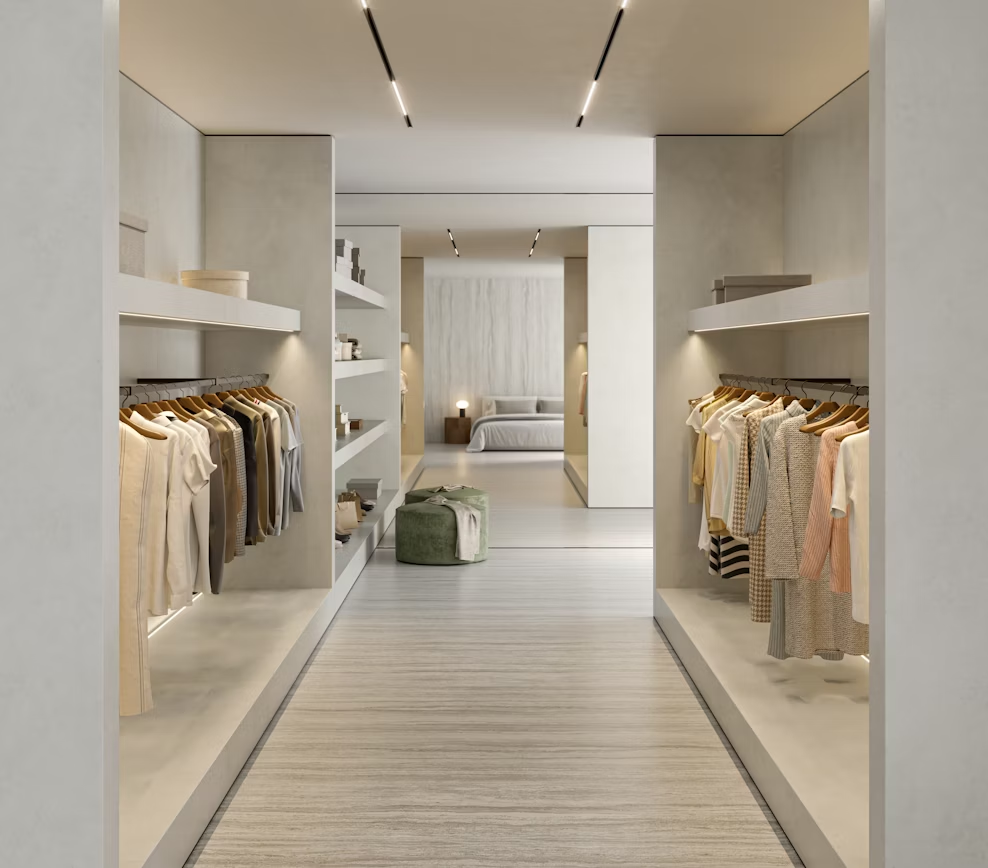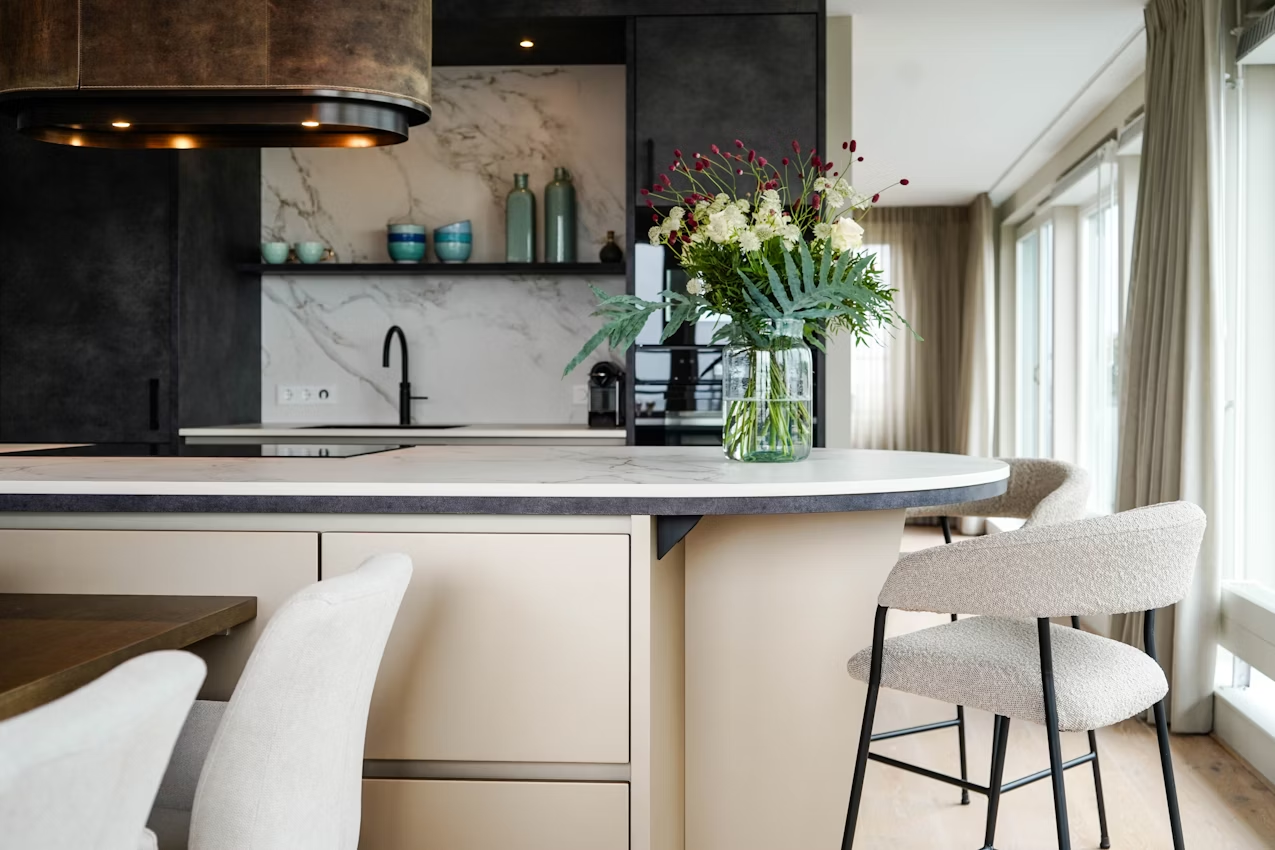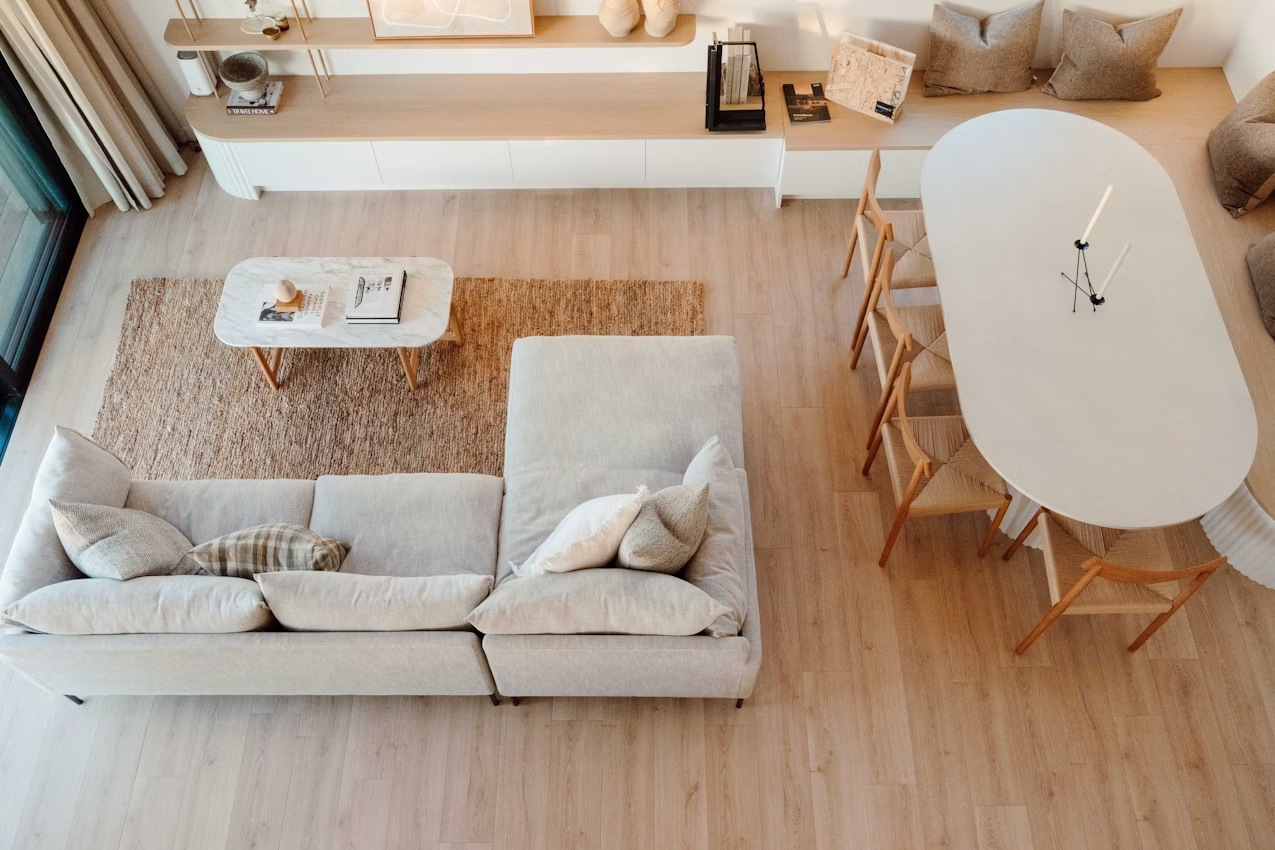
Elegant White Quartz: Stylish, Affordable & Durable
Natural stone worktops have been part of our ancestor’s homes for centuries. In this modern era, engineered quartz worktops have taken the place of natural stones. Moreover, the Gen Z era demands smooth and non-porous material that is sustainable, budget-friendly, and user-friendly. Now, interior designing is considered incomplete without the installation of quartz worktops kitchen.
And from all colours and patterns of this engineered surface, only white quartz worktop has earned a special designation in our kitchens. Quartz countertops have become the trendiest choice all over the UK. Homeowners, especially those who are a bit budget-conscious, can buy quartz kitchen worktops without a second guess.
In this guide, we are comparing widely known natural stone marble with our premium engineered quartz material. Here, we will highlight the key differences in durability, maintenance, and aesthetics. Our ultimate goal is to help you make the best choice for your kitchen.
Buy Premium Natural-Like Quartz Worktops at MO’s STONEX
At MO’s STONEX, we sell quartz kitchen countertops, splashbacks, upstands, and even window cills. No matter what’s your budget, our quartz worktop prices are predictable and slightly lower than our competitors. Did you know how?
We are unique in the UK. We design, source, create, fabricate, and install our own engineered quartz stone surfaces. This means we have full control in the entire process, from start to finish. Our direct model connects you to the creators. As a result, you gain unmatched quality and exceptional value, directly from us.
Get in touch with us at 01923223859 or 07432065334 to get cheap quartz worktops. Or, send an email to info@mosstonex.co.uk. To get a free quote, click here. And follow this link to get a free brochure.
What is Quartz Worktop?
A quartz kitchen worktop is an engineered stone surface, crafted primarily from natural quartz minerals. Around 90-95% of its composition is crushed quartz, one of nature’s hardest minerals. This is then combined with high-quality polymer resins, which act as a binder. Various pigments are also added to create a vast array of colours and patterns.

Then, the mixture is subjected to intense heat and pressure. As a result, it forms a dense, non-porous slab. This manufacturing process gives you a highly durable, stain-resistant, and low-maintenance surface. This makes it an incredibly popular choice for modern kitchens due to its blend of aesthetic versatility and practical resilience.
What is Marble Worktop?
A marble worktop is a natural stone surface, quarried directly from the earth. It is a metamorphic rock, primarily composed of recrystallised carbonate minerals, most commonly calcite or dolomite. Its distinctive veining and unique patterns are formed by mineral impurities present during its geological formation.
Thus, each slab of marble is inherently unique. It offers unparalleled natural beauty and a luxurious feel. Although highly praised for its aesthetic appeal and cool touch, marble is also known for being porous and softer than other stones. It requires more diligent care and maintenance to keep its natural appearance look perfect for decades.
A Quick Comparison Table Between Marble and Quartz Worktops
Here is a quick review table that states the difference between marble vs kitchen quartz countertops.
Feature of Comparison | Marble Worktops | Quartz Worktops | Who Wins? (Q = Quartz, M = Marble, T = Tie) |
| Composition | Natural stone, unique minerals | Engineered quartz, resin blend | Q |
| Appearance | Unique, organic, natural variations | Consistent, wide, predictable | Q |
| Heat Resistance | High tolerance, thermal shock risk | Moderate tolerance, resin sensitive | T |
| Stain and Water Resistance | Porous, stains, requires sealing | Highly resistant, non-porous | Q |
| Prices | Higher, varied, luxurious cost | More affordable, predictable cost | Q |
| Low-Maintenance | High care, regular sealing | Very easy, no sealing needed | Q |
| Durability | Softer, prone to scratches | Very hard, scratch resistant | Q |
| Sustainability | Natural, quarrying impact varies | Engineered, often recycled content | Q |
| Resale Value | Luxury, niche, high maintenance | Broad appeal, modern choice | Q |
| Indoor/Outdoor Use | Outdoor friendly, UV stable | Indoor only, UV sensitive | M |
Results: Q = 8 score, M = 1 score
Owners of quartz kitchens can analyse these features of comparison and decide which material is better for their newest worktops: marble or quartz.
Quartz vs. Marble: Top 10 Features Compared at MO’s STONEX
We understand that it’s a big decision to choose the perfect worktop for any kitchen upgrade. Two popular contenders often stand out: elegant natural marble and versatile engineered quartz. Both offer distinct advantages, but their differences can significantly impact your daily life and the overall feel of your space.
To help you decide with confidence, we have broken down their core characteristics. Here at MO’s STONEX, we compare their top 10 features of comparison. This will guide you through everything from durability and maintenance to aesthetics and cost.
Composition: Quartz vs Marble
Let’s explore what each popular worktop material is actually made of.
Quartz
Quartz kitchen worktops are a pure form of engineering. It is formed by blending nature’s strength with modern technology. Their core is finely crushed natural quartz, making up 90% to 95% of the slab.

Strong polymer resins bind these quartz particles together. These resins create an incredibly cohesive and durable surface. Then, pigments are carefully added to achieve a vast spectrum of consistent colours and patterns.
Some designs even include recycled glass or metallic flecks for unique aesthetics. This mixture is then subjected to intense pressure and heat. This process forms a dense and non-porous slab. The result is a uniform and high-performance material which is perfect for contemporary UK kitchens.
Marble
On the flip side, marble worktops tell a story millions of years in the making. They are 100% natural stone, quarried directly from the Earth. Their primary component is calcium carbonate, which recrystallises over geological time.
Intense heat and pressure deep within the earth form this beautiful metamorphic rock. Mineral impurities, such as clay, iron oxides, or silt, become trapped during its formation. These impurities create the stunning, unique veining and colour variations you see.
Remember, no two marble slabs are ever identical. You will see that each piece showcases nature’s unparalleled artistry, with distinct patterns and shades of colours. This organic formation gives marble its classic, luxurious appearance in any home.
Who Wins?
Quartz countertop emerges as a winner based on composition alone. It provides unmatched consistency and engineered uniformity. But that doesn’t mean marble is not great in composition. It offers unique natural beauty and exclusivity. Your preference for predictable design versus singular natural artistry guides the best choice.
Consistent Appearance / Aesthetics
Let’s see who wins when we talk about the consistent appearance of marble and quartz countertops.
Quartz
Quartz work tops available at MO’s STONEX offer unparalleled aesthetic consistency. Because they are engineered, every slab of a chosen design looks identical. This means seamless patterns across large surfaces or multiple pieces.
You can get a uniform look for your kitchen island and surrounding counters. It removes any surprises during installation. To be honest, homeowners appreciate knowing exactly what their finished kitchen will look like.

Moreover, the colour palette is vast, from crisp whites to deep blacks. Plus, it consists of various particulate sizes and subtle veining options. This predictability makes quartz ideal for modern, minimalist designs where clean lines and consistent tones are demanding.
So, this engineered surface guarantees a cohesive and polished finish every time.
Marble
Marble worktops provide a unique and luxurious aesthetic. In simple words, each slab is a true natural artwork. Actually, its beauty comes from organic veining and intricate colour swirls.
These patterns develop over millions of years within the earth. That clearly shows that no two pieces of marble are ever precisely alike. This means your kitchen will have a unique look with the help of different patterns and shades of each slab of marble.
Many homeowners cherish these natural variations and subtle imperfections. They add character and a sense of history to the space. Marble brings a timeless elegance and sophistication.
Its rich patterns and translucent qualities are highly appreciated. It creates a stunning focal point in any kitchen. At the same time, it showcases nature’s individual touch.
Who Wins?
For consistent appearance, quartz clearly wins. Its engineered nature ensures precise colour and pattern matching across all slabs. This delivers complete predictability and uniformity for your entire kitchen design.
Heat Resistance
Let’s talk about heat resistance capabilities of quartz countertops vs marble countertops.
Quartz
Quartz countertops offer good heat resistance, but they are not entirely heat-proof. Natural quartz minerals themselves can withstand high temperatures. However, the polymer resins used to bind the quartz is sensitive to intense heat.
These resins can scorch, discolour, or even melt if exposed to prolonged or extreme temperatures. Quartz worktops can endure temperatures up to approximately 150°C (302°F) without significant damage. Placing very hot items, such as pans straight from the hob or oven, directly onto the surface is not recommended.
It risks thermal shock, which can cause cracks, especially on cooler surfaces. So, always use trivets or heat pads to protect your quartz surface from direct heat.

Marble
On the other hand, marble worktops (as a natural stone) have inherent heat resistance. As you know that they are formed under intense heat and pressure within the earth, they can tolerate higher temperatures than engineered quartz. It can withstand temperatures up to approximately 250°C (482°F) without fear of melting or scorching.
However, despite its impressive heat tolerance, it is still advisable to use trivets. That’s why placing extremely hot items directly on marble can sometimes lead to thermal shock (just like it could happen in quartz). This sudden temperature change can cause the stone to expand or contract too rapidly.
It potentially results in hairline cracks. Additionally, hot items could transfer stains if spills occur simultaneously.
Who Wins?
Although marble has superior heat resistance, it’s a tie. You should not place hot pans and pots directly on these surfaces. Both materials benefit from using trivets to prevent thermal shock and ensure longevity.
Stain and Water Resistance
So, which material is stain and water resistant: quartz or marble? It’s time to find the best material that resists stains, water, and moisture.
Quartz
Let’s talk about stain resistance properties of engineered quartz first. They are incredibly resistant to stains and water. Their engineered composition includes non-porous resins. This creates a surface that liquids cannot easily penetrate.
Spills like coffee, wine, oils, or food colourings simply sit on its work top. Then, a quick wipe with a damp cloth cleans them away effortlessly. You will not need to seal quartz kitchen worktops, ever. This makes daily maintenance wonderfully simple.

Its impermeability also means water absorption is virtually zero. This prevents issues like mould or mildew growth beneath the surface. Quartz offers exceptional peace of mind against everyday spills for busy UK households looking for a low-maintenance option.
Marble
Contrarily, marble worktops (beautiful as they are) are naturally porous. This means liquids can seep into the stone while causing stains. Acidic substances like lemon juice, vinegar, or even wine can etch the surface.
Besides that, etching removes the polish and leaves dull, visible marks. These are not stains you can simply wipe off. Marble requires regular sealing to enhance its resistance. Even with sealing, vigilance is important.
Here, spills need immediate attention to prevent absorption or etching. Water can also be absorbed, especially if left standing. It leads to watermarks or discolouration over time. Its elegant beauty comes with a need for consistent care and maintenance.
Who Wins?
Quartz clearly wins for stain and water resistance. Its non-porous surface makes it highly resistant to spills. Moreover, it needs no sealing. On the other hand, marble’s porous nature demands constant vigilance and regular maintenance.
Marble vs Quartz Worktop Prices
Let’s explore how the costs of these popular worktop materials compare for your home.
Quartz
Quartz worktop prices in the UK mostly range from £200 to £400 per square metre, including material. However, prices vary significantly based on several factors. Premium brands and designs can cost more, especially those mimicking natural marble patterns. Thicker slabs (e.g., 30 mm versus 20 mm) also increase the price due to more material use.
Furthermore, custom features like intricate edge profiles, polished cut-outs for sinks, or drainage grooves add to the overall cost. While not the cheapest option, quartz offers consistent quality and a wide selection. Its predictable pricing and clear specifications make budgeting simpler for UK homeowners.
Marble
Marble worktop prices range from £300 to £550 per square metre in the UK for the material alone. However, this natural stone can sometimes exceed £1000 per square metre for rare types. The price depends heavily on the marble’s specific type, its origin, and its rarity.
For example, Carrara marble is often more affordable than exotic Calacatta or Statuario varieties. Slab thickness, unique veining patterns, and the size of the slab also influence the final cost. Fabrication and installation for marble are more complex due to its weight and brittleness. This often means higher labour costs compared to engineered materials.
Who Wins?
Quartz wins for affordability. It offers a more predictable price range. Plus, it is less expensive quartz per square metre than most marble varieties. This makes it a more budget-friendly option for many UK kitchens.
Low-Maintenance
When choosing a work top, how much effort you want to put into its maintenance really matters.
Quartz
Kitchen worktops made of quartz are incredibly easy to maintain. They are non-porous, stain resistant, liquids resistant, and never need sealing. In other words, daily cleaning is simple; a wipe with warm soapy water is usually more than enough.
As we have mentioned before, it resists common kitchen spills like coffee, wine, or oil effectively. The material also does not harbour bacteria. So, it contributes to a hygienic kitchen environment. This makes quartz ideal for busy UK households.
It stands up well to everyday use while resisting scratches and chips from normal kitchen activities. Hence, we can proudly say that quartz offers a beautiful surface with minimal effort required to keep it looking new for years.
Marble
Marble worktops require a higher level of maintenance. Being naturally porous, they need regular sealing to protect against stains and moisture absorption. This sealing process occurs annually or bi-annually.
Spills, especially acidic ones, demand immediate cleanup to prevent etching and permanent marks. Moreover, using specific, pH-neutral cleaners is essential to avoid damaging the surface.
Marble is also softer than quartz. This makes it more prone to scratches and chips from heavy impact. Some owners embrace the development of a ‘patina’ over time, while others prefer its original perfect state. Its beauty demands consistent and careful attention.
Who Wins?
Quartz significantly wins in low-maintenance. Its non-porous nature eliminates sealing needs and makes cleaning effortless. Marble, being porous, demands regular sealing and immediate attention to spills for its preservation.
Durability / Scratch Resistance
When it comes to marble vs quartz, it’s important to consider durability as a feature of comparison.
Quartz
Quartz has impressive durability and excellent scratch resistance. Its high concentration of natural quartz minerals makes it extremely hard. This helps it resist daily kitchen wear and tear effectively. That’s why knives and abrasive pads rarely leave a mark under normal use. Also, chips and cracks are uncommon unless subjected to severe impact.
Moreover, its engineered consistency means strength is uniform in the entire slab. In addition to that, fabricators can create a wide array of edge profiles. Quartz handles intricate cuts well – from simple eased edges to more decorative bullnose or ogee styles. These edges remain strong and chip-resistant, providing robust and lasting beauty for your UK kitchen.
Marble
Marble is undeniably beautiful, but it is a softer stone compared to quartz. This makes it more susceptible to scratches from knives or abrasive cleaning materials. It can chip or crack if heavy objects are dropped onto its surface. While durable in its own right, marble requires more careful handling in a busy kitchen environment.
Furthermore, its natural formation means hardness can vary slightly across a marble slab. However, its fabricators can create various edge profiles. Still, intricate or very thin edges are more vulnerable to chipping than those on quartz. The natural veins, though beautiful, can sometimes represent areas of slightly weaker integrity.
Who Wins?
Quartz wins for overall durability and scratch resistance. Its engineered hardness and uniform composition make it highly resistant to daily wear and accidental damage. Marble, a softer natural stone, requires more care.
Sustainability: Quartz and Marble Comparison
Let’s walk through the sustainability feature to find who wins in this battle of marble and quartz countertops.
Quartz
Quartz kitchen work tops offer several sustainability advantages that no other natural stone (granite, marble, and soapstone) provides. They are engineered, often incorporating recycled materials like glass or mirror fragments. This reduces the need for virgin raw materials.
Plus, quartz is made from one of the most abundant minerals on Earth. It limits resource depletion. The manufacturing process is often more controlled than quarrying. Some manufacturers use recycled water and renewable energy, further lowering the environmental footprint.
Not only that, its exceptional durability and low maintenance also contribute. A long lifespan means less frequent replacement, reducing waste over time. Additionally, quartz doesn’t require harsh chemical sealants, which is better for indoor air quality and the environment in UK homes.
Marble
Marble, being a natural stone, has a complex sustainability profile. Its extraction through quarrying can cause significant environmental disruption. This includes habitat destruction, noise pollution, and dust.
And did you know what adds to carbon emission? Heavy machinery use and transportation of large, heavy slabs! Also, water is used in quarrying and processing, with potential for contamination.
However, marble is a naturally occurring material which is free from synthetic resins. It has incredible longevity; monuments lasting centuries prove its durability. It is a sustainable choice only when sourced from quarries with responsible practices.
It is a great option if properly maintained to avoid early replacement. Its recyclability for other uses like landscaping is also a plus.
Who Wins?
Quartz has an edge for overall sustainability. Its engineered composition allows for recycled content and more controlled manufacturing processes. Although marble is natural and durable, its extraction and transport have a larger environmental impact.
Resale Value
Considering future property value between marble vs quartz kitchen countertops is a smart move.
Quartz
At MO’s STONEX, our quartz kitchens have a greater home’s resale value in the UK. Their modern aesthetic and extensive colour options attract a wide range of buyers. The perception of quartz as a premium, low-maintenance, and highly durable material is a strong selling point.
Buyers appreciate knowing they are investing in a kitchen that requires minimal maintenance and will look good for years. This reduces the likelihood of immediate renovations for the new owner. Real estate experts and realtors highlight quartz kitchen worktops in property listings.
This can attract discerning buyers and potentially lead to quicker sales or higher offers. Quartz represents a smart, long-term investment for any UK property.
Marble
Oppositely, marble stone worktops add a touch of luxury and prestige, which can positively impact resale value. Its timeless elegance and unique natural patterns are highly desirable to a segment of buyers. Homes featuring genuine marble often convey an image of sophistication and customised design.
However, marble’s higher maintenance requirements is a major concern to potential buyers seeking a “move-in ready” property. The possibility of etching, staining, or scratching (if not properly cared for) is an issue. So, marble appeals to those buyers who appreciate its natural beauty and are willing to accept its high-maintenance. It does not universally resonate with all buyers as broadly as quartz.
Who Wins?
Quartz is the winner for broad resale appeal. Its low maintenance, durability, and consistent modern aesthetic attract a wider range of buyers. Although marble offers luxury, its higher maintenance needs can limit its universal appeal.
Indoor and Outdoor Use?
Choosing a quartz or marble worktop means thinking about where it will live, especially its resilience to the sun.
Quartz
Our quartz countertops are primarily designed for indoor applications. The resins binding the quartz particles are sensitive to ultraviolet (UV) light. That’s why prolonged exposure to direct sunlight causes these resins to degrade. It causes discolouration, yellowing, or fading of the worktop’s colour. It can also weaken the material over time.
Therefore, standard engineered quartz is not recommended for outdoor kitchens, barbecues, or any area receiving significant direct sunlight. Even kitchens with large south-facing windows should consider UV film or blinds. Although some specialised outdoor quartz products exist, they are rare and specifically formulated for UV stability.
Marble
As you know that marble is a natural stone, it is inherently resistant to UV rays. It is perfectly suitable for both indoor and outdoor use. Direct sunlight will not cause marble to fade, yellow, or discolour over time. Its natural beauty remains stable even under intense UV exposure.
This is why marble has been used for outdoor sculptures, architectural cladding, and paving for centuries. For outdoor kitchens or garden features in the UK, marble is a reliable choice. It requires sealing for stain protection but its resistance to the elements is a significant advantage. Its natural composition ensures its colour and integrity endure outdoors.
Who Wins?
Marble clearly wins for outdoor use and UV resistance. As a natural stone, it withstands sunlight without fading or discolouring. Quartz, due to its resin content, is generally limited to indoor applications.
Conclusion
After comparing these top features, quartz is clearly the overall winner. Just consider its practical advantages in consistency, stain and water resistance, pricing, low maintenance, and durability. They shows quartz scores an impressive 8.5 out of 10 for most modern UK kitchens. On the other side, marble offers unique natural beauty and superior outdoor performance. Still, quartz provides unmatched everyday resilience and value.
So, are you ready to upgrade your kitchen? Let’s discover our premium quartz worktops at MO’s STONEX. Contact us today at 01923223859 or 07432065334. You can also email us at info@mosstonex.co.uk. Let us help you create your dream kitchen.







